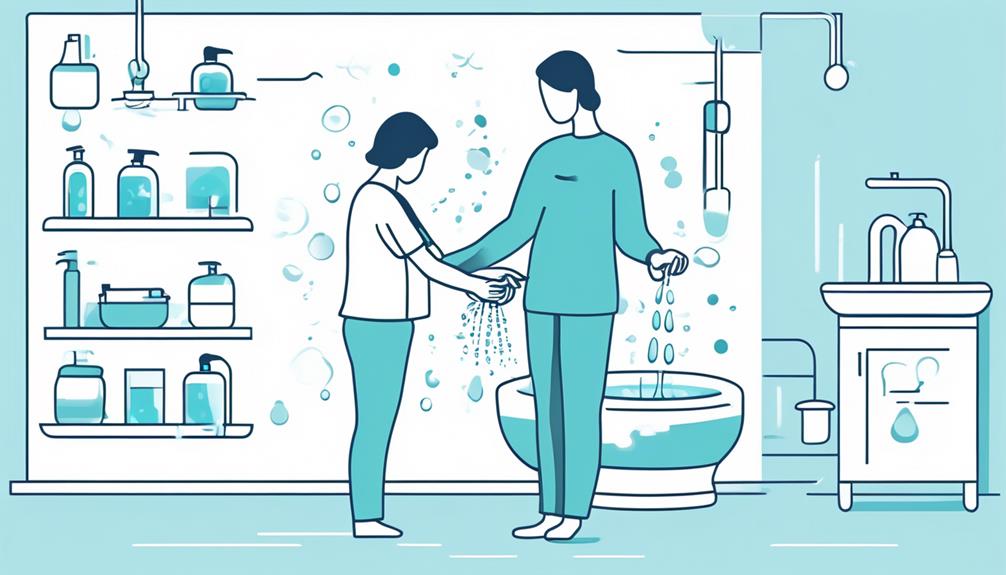When it comes to combating waterborne diseases, the vast array of remedies can sometimes feel overwhelming. From traditional antibiotics for bacterial infections to the more nuanced approach of herbal remedies and dietary recommendations, the options available can be both reassuring and perplexing.
However, while navigating through this maze of solutions may seem daunting, understanding the nuances of each remedy and how they work could be the key to effectively addressing these diseases.
Key Takeaways
- Boiling water, using filters, and disinfectants like chlorine can kill harmful microbes.
- Good hygiene practices, such as handwashing, help reduce waterborne illness spread.
- Timely medical attention is crucial if waterborne illness is suspected.
- Herbal remedies, supplements, and dietary recommendations can complement conventional treatments and promote overall well-being.
Understanding Waterborne Diseases
Understanding waterborne diseases starts with recognizing how microbes thrive in water sources. These disease-causing germs, such as bacteria, viruses, and parasites, contaminate water bodies due to various factors like poor sanitation, sewage overflow, and agricultural runoff. When ingested, these microbes can lead to illnesses like diarrhea, cholera, and typhoid fever.
To prevent waterborne diseases, it's crucial to ensure that water sources are properly treated and safeguarded. Boiling water before consumption, using water filters, and adding disinfectants like chlorine are effective methods to kill harmful microbes. Additionally, practicing good hygiene, such as washing hands before eating and after using the restroom, can help reduce the spread of waterborne illnesses.
Symptoms and Diagnosis
Recognizing the symptoms of waterborne diseases is crucial for timely diagnosis and treatment. Here are four key points to help you understand the symptoms and diagnosis process:
- Common Symptoms: Symptoms of waterborne diseases can include diarrhea, nausea, vomiting, abdominal cramps, and fever. If you experience any of these, especially after consuming questionable water, it's essential to seek medical attention.
- Dehydration Signs: Watch out for signs of dehydration such as dry mouth, dark urine, dizziness, or fatigue. These can be indicators of severe waterborne illnesses that require immediate medical intervention.
- Specific Disease Symptoms: Different waterborne diseases may present unique symptoms. For instance, Giardiasis can lead to greasy stools, while Hepatitis A can cause jaundice. Knowing these specific signs can help in accurate diagnosis.
- Diagnostic Tests: Doctors may use stool samples, blood tests, or imaging studies to diagnose waterborne diseases. Early diagnosis through these tests can lead to prompt treatment and better outcomes. If you suspect a waterborne illness, consult a healthcare professional promptly for proper diagnosis and management.
Antibiotics for Bacterial Infections
If you have been diagnosed with a bacterial infection, antibiotics may be prescribed to help treat the illness effectively. Antibiotics work by targeting and killing the bacteria causing the infection in your body. It's crucial to take the full course of antibiotics as prescribed by your healthcare provider, even if you start feeling better before you finish the medication. This helps ensure that all the bacteria are eradicated, reducing the risk of antibiotic resistance.
Common antibiotics used to treat bacterial infections include penicillin, amoxicillin, and azithromycin. These antibiotics are often prescribed based on the type of bacterial infection you have and its severity. It's important to follow the dosage instructions carefully and inform your healthcare provider of any allergies or adverse reactions you may experience while taking the medication.
Antiparasitic Medications
When treating parasitic infections, antiparasitic medications are commonly prescribed by healthcare providers to target and eliminate the parasites from your body. These medications work by either killing the parasites or inhibiting their growth and reproduction, helping you recover from the infection effectively.
Here are some key points to consider when using antiparasitic medications:
- Types of Parasites: Different antiparasitic medications are used depending on the type of parasite causing the infection, such as protozoa or helminths.
- Treatment Duration: The duration of treatment with antiparasitic medications can vary based on the specific parasite and the severity of the infection.
- Potential Side Effects: Like any medication, antiparasitic drugs can have side effects ranging from mild to severe, so it's essential to be aware of these and discuss them with your healthcare provider.
- Follow-Up Testing: After completing a course of antiparasitic treatment, follow-up testing may be necessary to ensure that the parasites have been successfully eliminated from your body.
Antiviral Treatments
Now, let's talk about Antiviral Treatments.
You can learn about ways to prevent viral infections, the different types of antiviral medications available, and compare their effectiveness in treating waterborne diseases.
Understanding these crucial points will help you make informed decisions about managing and combating viral infections effectively.
Viral Infection Prevention
Antiviral treatments are essential in preventing the spread and severity of viral infections. To effectively prevent viral infections, consider the following tips:
- Proper Hygiene: Wash your hands frequently with soap and water to reduce the risk of viral transmission.
- Vaccination: Stay up to date with vaccinations to build immunity against common viral infections.
- Avoid Close Contact: Limit contact with individuals who are sick to lower the chances of viral spread.
- Healthy Habits: Maintain a healthy lifestyle with a balanced diet, regular exercise, and adequate rest to support your immune system in fighting off viruses.
Following these practices can significantly reduce the risk of contracting and spreading viral infections.
Antiviral Medication Types
Exploring various types of antiviral medications provides insight into their effectiveness against different viral infections. Antiviral drugs can be classified into several categories based on their mechanisms of action. Some common types include nucleoside/nucleotide analogs, protease inhibitors, and neuraminidase inhibitors.
Nucleoside/nucleotide analogs like acyclovir are often used to treat herpes infections, while protease inhibitors such as ritonavir are crucial in managing HIV. Neuraminidase inhibitors like oseltamivir are effective against influenza viruses. Each type of antiviral medication targets specific steps in the viral replication cycle, inhibiting the virus's ability to multiply and spread in the body.
Understanding these different types of antiviral drugs can help healthcare providers tailor treatment plans to combat various viral infections effectively.
Treatment Effectiveness Comparison
Comparing the effectiveness of different types of antiviral medications provides valuable insights into their varying abilities to combat viral infections. Here are four key points to consider when evaluating the effectiveness of antiviral treatments:
- Viral Strain Specificity: Some antiviral medications are more effective against specific viral strains than others.
- Treatment Timing: The effectiveness of antiviral treatments can vary based on the stage of the viral infection when treatment is initiated.
- Side Effects: Understanding the potential side effects of different antiviral medications is crucial in determining treatment effectiveness.
- Resistance Development: Monitoring the development of antiviral resistance is essential to assess the long-term effectiveness of treatments.
Consider these factors when comparing the effectiveness of antiviral medications for waterborne viral diseases.
Hydration and Electrolyte Replacement

To effectively combat waterborne diseases, ensuring proper hydration and replenishing electrolytes is crucial for your body's recovery and well-being. When you're sick with a waterborne illness, your body loses fluids through symptoms like diarrhea and vomiting, leading to dehydration and an imbalance in essential electrolytes like sodium and potassium.
Rehydrating with clean, safe water, oral rehydration solutions, or electrolyte drinks helps restore lost fluids and minerals, aiding in your recovery process.
Remember to sip fluids slowly to prevent overwhelming your system, and if you struggle to keep liquids down, try small, frequent sips or sucking on ice chips. Electrolyte replacement drinks or homemade solutions with salt and sugar can assist in restoring the balance of minerals in your body. Avoid beverages like caffeinated drinks, alcohol, or sugary sodas, as they can worsen dehydration.
Herbal Remedies and Supplements
Let's explore the benefits of herbal remedies and supplements in combating waterborne diseases.
Discover the natural healing properties and advantages these alternatives offer for your health.
Learn how incorporating herbal remedies and supplements can aid in your recovery and overall well-being.
Herbal Remedies Overview
When exploring ways to address waterborne diseases, consider incorporating herbal remedies and supplements into your treatment plan. Herbal remedies offer a natural approach that can complement conventional treatments.
Here are four herbal remedies that can aid in combating waterborne diseases:
- Ginger: Known for its anti-inflammatory properties, ginger can help ease gastrointestinal issues commonly associated with waterborne illnesses.
- Turmeric: With its powerful antioxidant and anti-inflammatory effects, turmeric can support the body's immune response during infections.
- Garlic: Garlic is a potent antimicrobial agent that can help fight off harmful pathogens causing waterborne diseases.
- Echinacea: This herb is believed to enhance the immune system, potentially reducing the severity and duration of waterborne infections.
Supplement Benefits
Consider incorporating herbal remedies and supplements into your treatment plan to enhance the effectiveness of combating waterborne diseases. Supplements can provide additional support to your immune system and overall health. Below is a table listing some beneficial supplements and their advantages:
| Supplement | Benefits | Recommended Dosage |
|---|---|---|
| Vitamin C | Boosts immune system and aids recovery | 500-1000mg daily |
| Probiotics | Helps maintain gut health | Follow instructions on label |
| Echinacea | Supports immune function | 300-500mg three times a day |
| Zinc | Reduces duration and severity of illness | 15-30mg daily |
Integrating these supplements into your routine can help strengthen your body's defenses against waterborne diseases.
Dietary Recommendations for Recovery

To aid in your recovery from waterborne diseases, focus on incorporating nutrient-rich foods into your diet. Here are four dietary recommendations to help you regain your strength and promote healing:
- Hydrate with Water: Drink plenty of clean, filtered water to flush out toxins and stay hydrated. Proper hydration is essential for supporting your body's recovery process.
- Include Electrolyte-Rich Foods: Consume foods high in electrolytes such as bananas, coconut water, and leafy greens to replenish essential minerals lost during illness.
- Opt for Lean Proteins: Incorporate lean proteins like chicken, fish, tofu, or legumes into your meals to support muscle repair and overall recovery.
- Load Up on Fruits and Vegetables: Fill your plate with a variety of colorful fruits and vegetables rich in vitamins, antioxidants, and fiber to boost your immune system and aid in digestion.
Probiotics for Gut Health
For a healthy gut, incorporating probiotics into your diet can be beneficial. Probiotics are live bacteria and yeasts that are good for your digestive system. They can help balance the friendly bacteria in your intestines, which is essential for overall gut health. You can find probiotics in certain foods like yogurt, kefir, sauerkraut, and kimchi. These foods can help restore the natural balance of bacteria in your gut and improve digestion.
Probiotics can also aid in preventing and treating diarrhea, especially when it's caused by antibiotics or infections. They work by replenishing the good bacteria in your gut, which may have been depleted due to illness or medication. Additionally, probiotics have been linked to enhancing immune function and reducing inflammation in the gut.
To maximize the benefits of probiotics, consider incorporating them into your daily diet. You can also opt for probiotic supplements, but make sure to consult with a healthcare provider before starting any new supplement regimen. By taking care of your gut health through probiotics, you can promote overall well-being and strengthen your body's natural defenses against waterborne diseases.
Prevention Strategies and Hygiene Practices

Implementing effective prevention strategies and practicing good hygiene are crucial steps in safeguarding against waterborne diseases. By following these simple yet powerful measures, you can significantly reduce the risk of falling victim to these harmful illnesses:
- Boil or Treat Water: Always ensure that water for drinking or cooking is boiled or treated with chlorine to kill any harmful pathogens present.
- Proper Handwashing: Wash your hands thoroughly with soap and clean water before handling food, after using the bathroom, and after any contact with potentially contaminated water sources.
- Safe Food Handling: Store food properly, avoid consuming raw or undercooked foods, and wash fruits and vegetables with clean water before eating.
- Avoid Contaminated Water: Refrain from swimming or bathing in water bodies known to be contaminated, and try to use safe water sources for all your daily activities.
Frequently Asked Questions
Can Waterborne Diseases Be Transmitted Through Physical Contact With an Infected Person?
Yes, waterborne diseases can be transmitted through physical contact with an infected person. It's essential to practice good hygiene, such as washing hands regularly, to prevent the spread of these illnesses and protect yourself from getting sick.
Are There Any Specific Vaccines Available to Prevent Waterborne Diseases?
Preventing waterborne diseases is like building a shield against invisible foes. Vaccines are crucial in this battle. Ensure you stay protected by consulting healthcare providers for specific vaccines that can safeguard you from waterborne illnesses.
How Long Does It Typically Take to Recover From a Waterborne Disease?
Recovering from a waterborne disease usually takes a few days to a couple of weeks. Stay hydrated, get rest, and follow your doctor's instructions. With proper care, you'll be back to feeling healthy soon.
Are There Any Long-Term Effects or Complications Associated With Waterborne Diseases?
Imagine a ripple effect from waterborne diseases. Long-term complications like chronic fatigue, organ damage, and weakened immunity can linger. Stay vigilant, seek proper treatment, and prioritize clean water sources to safeguard your health.
Can Water Filtration Systems Effectively Prevent Waterborne Diseases?
Yes, water filtration systems can effectively prevent waterborne diseases by removing harmful pathogens and contaminants from water sources. Regular maintenance and proper use of filtration systems are essential to ensure their effectiveness in safeguarding your health.
Conclusion
In conclusion, by understanding the symptoms and treatments for waterborne diseases, you can effectively combat these illnesses.
Antibiotics, antiparasitic medications, and antiviral treatments are crucial in fighting off infections.
Herbal remedies, dietary recommendations, and probiotics can also aid in recovery.
Remember to practice good hygiene and prevention strategies to keep yourself and your loved ones healthy.
Stay informed and take action to protect yourself against waterborne diseases.
